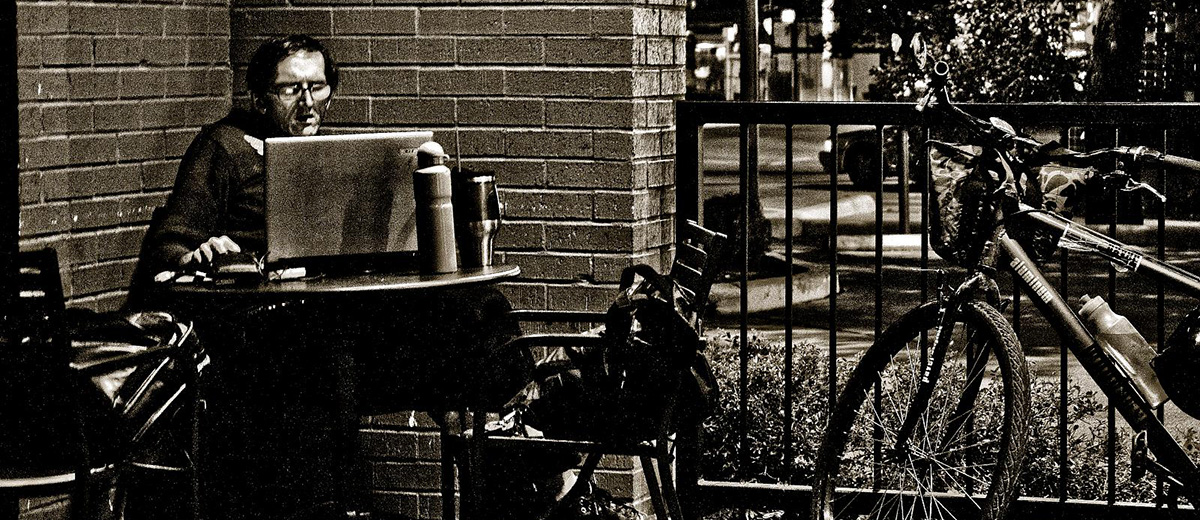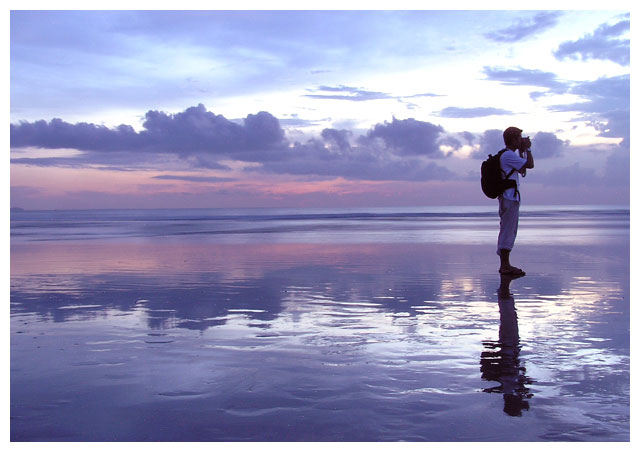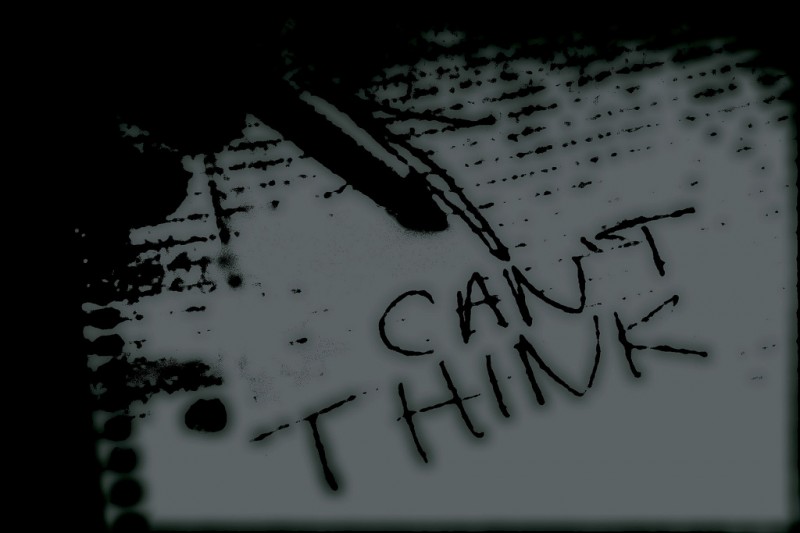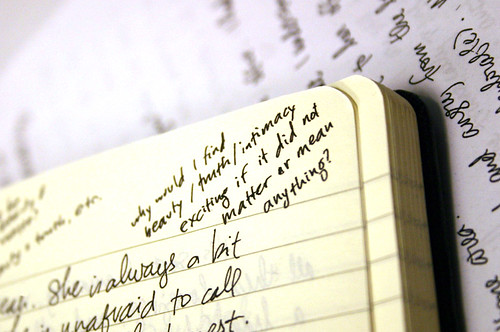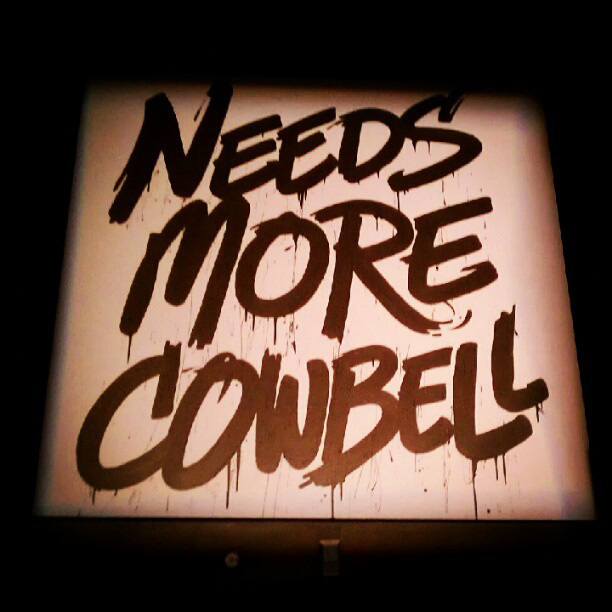Way back in the dark ages of 2007, we published a series on how to be a better travel writer/blogger. We pulled together the best tips, techniques, exercises and bold inspiration from the most brilliant writing minds in the world.
Vagabondish is reader-supported. When you buy through links on our site, we may earn a small affiliate commission. Read our disclosure.
Now, more than seven years on, we’ve combined that series into a single kickass guide with updated content and prettier pictures!. It’s our bible of sorts to being a better travel writer and (perhaps more importantly for some) a better travel blogger. Enjoy!
Essential Tips & Habits
#1: Have a F**king Point!
Steve Martin had a great line in Planes, Trains and Automobiles. After traveling for days with John Candy and politely listening to his inane story-telling, Martin snaps:
You know when you’re telling these little stories? Here’s a good idea: have a point! It makes it so much more interesting for the listener!
For some, concise, engaging story-telling comes naturally; while others can’t help but bloat their tales with every unnecessary detail. Pack your travel writing like you pack your luggage: load in everything you think you’ll need, then reduce it by half.
#2: Nobody Cares What You Did
Pack your travel writing like you pack your luggage: load everything you think you’ll need, then reduce it by half.
This is especially important for budding travel writers seeking publication (and all the attendant fortune and fame). It’s not about your experience, but whether you can convey that experience to your readers in a way that’s interesting and engaging.
A writer like Bill Bryson routinely takes the most mundane happenings and crafts narratives around them that amuse even the most hardened, humorless reader. Remember that it’s about the story, not the actual event. Don’t tell me what you did; show me.
#3: Sleep On It
I rarely publish anything without first sleeping on it. Often, I’ll “brain dump” what I have to say without editing, save it and walk away.
Try it and come back to it later with a clearer head and you’ll be better prepared to distil your initial prose down to only its most essential parts.
#4: Kick Yourself Around A Bit
No one likes a genuine smartass. Especially with travel narratives, know when to be self-deprecating and how not to take yourself too seriously. Practice humility and your readers will more easily relate to you as a real person rather than a know-it-all preaching to them about all the wonderful things you’ve done.
#5: Vary Your Reading Everyday
Always be in the middle of at least two books – one fiction and one non-fiction. This exercises all parts of your brain: the analytical and the imaginative.
#6: Diversify Your Bookshelf With A Potpourri of Authors
Creative people have a tendency — subconscious or otherwise — to mimic what they’ve recently seen, heard or read. While this can be a good thing, it can also quiet one’s own unique voice.
Reading only travel guides and books by one great author can help educate you as to what works well. But I find it less than ideal to start writing my own travel memoirs immediately after reading multiple books by, say, Tim Cahill. Step outside your reading “comfort zone” and mix up your influences.
#7: Beat Procrastination
But you don’t procrastinate, do you? Ah … denial – first sign!
Like any addiction, the first step toward full productivity is admitting that you have a problem. Habitual procrastinators may wish to install a plugin like Strict Workflow (a Chrome plugin that works to whip your workflow into shape) or Mind the Time (a Firefox plugin that tracks the amount of daily time that you waste at BuzzFeed, The Daily Puppy, et. al. down to the second).
If nothing else, this will make you conscious of the minutes, hours and days that you’re wasting when you could be writing! And, of course, the best way to beat procrastination is to …
#8: Remove Distractions
Author Naomi Novik notes in an inspirational e-mail for the NaNoWriMo contest:
Remove distractions. The internet is a phenomenal research and community tool without which you might never have started the novel you’re working on right now. It is an equally phenomenal tool for procrastination and wasting time. Unplug your connection. While you’re at it, put down that book, turn off the TV, shut down the Wii. Make scrambled eggs and salad for dinner. The dishes can wait to be washed. Ideally, get out of your house filled with your stuff that you like and go somewhere where you have nothing better to do than write.
I have the attention span of a meth-fueled gnat. It can be hard to focus, so it’s essential to find ways to purify your particular environment by removing all distractions.
#9: Learn Something New Everyday
It’s easier than it sounds. I’m not suggesting learning a new language or how to cook like Anthony Bourdain overnight.
Baby steps: learn the French verb conjugations for “to be”; learn what species that bird is that merrily chirps at your window sill every morning; or memorize the seven wonders of the world.
Every day, make a point to learn one small thing that you never knew before. You’ll be more well-rounded and broaden your ability to better convey your thoughts.
#10: Join a Writer’s “Sewing Circle”
After signing up for NaNoWriMo, I was shocked by how many local authors were looking to meet up to group write, swap tips and critique their fellow writers’ work. The worldwide community of budding authors is much larger than you think. Network and connect with other writers in your area and you’ll be surprised how much you can learn from them.
#11: Find Your “Golden Hour”
Uncover that magical time of day when you’re writing flows best. I find my inner brilliance to shine in the early morning. As the day drags on and I’ve answered e-mails, phone calls, and generally flooded my brain with the day’s torrent of updated RSS feeds, it’s more difficult to make the cranial connections necessary to craft a good story.
Even better: find an entire day where you have no previous engagements and start writing in the morning. You’re less likely to have anything pressing on your mind throughout the day.
#12: Forget About Travel (… for Now)
All work and no play makes you a dull writer. Stop reading, writing, living and breathing travel long enough to delve into other interests. Go for a week-long hike in the woods; cook dinner for your friends or family; or step out to see a heart-wrenching film — anything non-travel-related to exercise your brain.
#13: Grammar School Outlining
Remember drafting outlines in grammar school, complete with indented roman numerals and never-ending subheadings? It’s old school and cliché, but that’s because it works.
For projects of any scale — whether a 500-word blog post or 50,000-word novel — try jotting down five or ten touchstone issues, turning points, or essential events of your piece. This can kickstart your inner muse enough to begin connecting all the ancillary elements of your story.
#14: Be Prepared When Eureka Strikes
When was the last time you had a great idea when you were sitting down specifically to think of a great idea? Me neither. Eureka moments frequently happen in the shower or on our way to work as we zone-out in traffic.
Bottom line: your muse will usually strike when you least expect it. Be prepared and always have a small journal or notebook and two pens (one as backup) to record your brilliance.
#15: Pressure Yourself (or Don’t)
Like any creative endeavor, writing flows from different people in different ways. Some folks relish the pressure and find that it summons their inner muse; some don’t.
Personally, if I sit down to write and nothing comes to me, I’ll walk away until the ideas start congealing in my subconscious enough for me to pick up where I left off.
On the other hand, some authors recommend setting aside, say, one hour to write. Grab an egg timer and sit down for sixty minutes to pressure yourself to craft something — anything.
Either way, determine what works best for you and stick with it.
#16: Read Your Work Aloud
A great way to determine the flow of your writing is to read it aloud. Even better is to find someone — a friend or honest critic — to whom you can read your work.
#17: Do Absolutely Nothing
This is one of my favorites for obvious reasons. At some point during your daily routine, lie on the couch, stare at the ceiling, and do absolutely nothing. No radio, no television, no internet. Nothing. Don’t take a nap. Instead, lie awake and collect your thoughts.
We’re so bombarded every day with information overload (and the myth of multitasking) that few people can or do take the time to just sit and quietly reflect.

Take time to do … absolutely nothing © moty66 (Flickr)
#18: Get in “The Zone”
Once you remove all external distractions, find whatever it is that helps you focus solely on the task of writing. This could be listening to classical music, keeping the television on for “white noise”, or plopping on some noise-canceling headphones simply to drown out the distracting sounds around you.
#19: Write Daily
“Practice makes perfect …” and all that, right? Virtually every writer – travel or otherwise – recommends this as one of the best ways to hone your craft. A personal blog is a great, simple outlet to chronicle your thoughts. Keep it personal and don’t worry if it’s not Nobel Prize-winning material. Use it for nothing more than a private writing exercise if you like.
#20: Write a Sh*tload
The National Novel Writing Month contest is a great inspiration for this and it ties in well with point #19 above. Try writing with a focus on quantity over quality. Think of it as a “brain dump” to simply get the words out of your head. Focus only on what you’re trying to convey rather than on how well you’d like to convey it. You can always edit later.
#21: Talk to Yourself …
… or anyone who’s willing to listen. Start a podcast and speak from the heart about anything which you’re particularly knowledgeable. The ability to speak extemporaneously is a great skill not only for public speakers but writers as well.
By training your brain to connect words in an unrehearsed and off-the-cuff manner, you’re laying the groundwork for a better understanding of language and how words relate to one another. This can go a long way towards breaking writer’s block and keeping the pen (or keys) moving.
#22: Get in the Mood
Try to step into the mood of your writing with appropriate music. If your work is about an angry character, get angry. Throw on your headphones and dial in some Lamb of God.
If your prose of the moment is somber, toss on a little Mumford & Sons or something to bring the mood down. Anything to better connect you with your work on an emotional level.
#23: Be Passionate, Soldier On
If you’re a blogger, the bad news is that I can tell you from personal experience that everyone starts as a small fish in a very, very large pond. The good news is that many of those fish give up and die off in the first three months. Be passionate and don’t grow discouraged. Push through that initial phase and you’ll already be ahead of a large majority of other bloggers.
If you’re a print writer or travel journalist, keep submitting your work. Listen to the constructive criticism of publishers and other writers in your field and use it to better yourself and your skills.

Perfect Stranger, Philadelphia © mezone
Time-Tested Techniques + Essential Exercises
#24: Keep a Swipe File
Not every bit of brilliant writing you craft needs to evolve into a great story or novel. I sometimes write a paragraph or two before realizing I don’t have enough info to say what I wanted to say. But if that brief excerpt is good quality stuff, why delete it?
Enter the swipe file:
A swipe file is simply a folder, real or electronic, containing examples of good copy. You might save a collection of killer headlines, several examples of powerful openings, a funny turn of phrase, a powerful call to action, and so on.
Never delete quality writing – it can always serve as a future springboard when you’re stuck or in a creative rut.
#25: Six Word Fiction
Also called “flash fiction”, such stories are characterized by extremely concise — and sometimes brilliantly witty — prose. Perhaps the best known “work” of six-word fiction is from Hemingway:
For sale: baby shoes, never worn.
Read that again and focus on how much Hemingway was able to say with so few words.
Try Flash fiction if only to practice brevity and best understand how to keep your prose as “tight” as possible. For inspiration, check out Wired magazine’s feature on this, titled Very Short Stories: 33 writers. 5 designers. 6-word science fiction.
#26: Take Your Opponent’s Side
Master the dying art of debate by understanding your opponent’s point of view. This is important for fiction and non-fiction writers as it provides a better understanding of all sides of an argument. You’re more likely to understand the characters in your novel or the folks you meet on the street if you can comprehend why they think the way they think, particularly if their views differ from yours.
Watch political debates for any party but yours; read religious publications or blogs if you’re an atheist; request PETA literature if you’re a hunter. Anything to step outside the echo chamber.
#27: Lie About Someone
Cafés and other public settings where people like to linger are great for this. Open your imagination by finding someone in a public setting and creating an entire persona or story around them. Describe their clothing, their personality, their lifestyle, to where they’ve traveled and what they did while there.
#28: Play Page Tennis
It’s like handing two artists two brushes and one canvas. Try it with two pens (or digital text documents) and a single sheet of paper. Every person writes a sentence and then passes it along.
This exercise of course scales well to allow multiple writers in a “sewing circle” to participate. The collaborative effort allows everyone to play off of the unexpected creativity of everyone else.
#29: 5 Things I Remember About …
Pick one place you’ve visited and write five things you vividly remember about it. Don’t think too much, just focus on writing. This jogs your brain’s long term memory and helps conjure vivid imagery that’s critical to recollecting your travel tales.
#30: Imagine You’re A Housefly …
… or any other creature or inanimate object and write from their/its point of view.
Professional photographers will tell you that the simplest way to mix things up with your photography is to look at your subject from a different or unexpected angle: look up at children; lie on the floor, staring eye-to-eye with pets; etc.
The same rule applies to writing. If you’re writing a travel narrative, step outside the first person and try to imagine what the same experience is like from someone (or something) else’s point of view.
#31: Object Correlative
Simply suggesting a feeling, thought or emotion is often more powerful than explicitly spelling it out for the reader.
Object correlative is a technique whereby the author merely suggests something about a character by detailing that character’s interaction with mundane objects in the story.
Author David Miller explains:
One of the most noted examples of all time is the “bacon fat” scene in Hemingway’s story “Soldier’s Home.”
Harold Krebs, a young soldier back in Kansas after being wounded in WWI, is unable to return to work, to his mother’s ideal of “a normal life.” Now he must endure her questioning at the breakfast table:
“I’ve worried about you too much, Harold,” his mother went on. “I know the temptations you must have been exposed to. I know how weak men are. I know what your own dear grandfather, my own father, told us about the Civil War and I have prayed for you. I pray for you all day long, Harold.”
Krebs looked at the bacon fat hardening on his plate.
#32: Minor Character as Mirror
Try seeing your story through the eyes of someone who played only a very small part in your experience – a shop/inn keeper, a cab driver or the woman who sat next to you on the sixteen hour bus ride through Australia.
Another great technique from David Miller who explains:
… the way a main character interacts with a minor character can also be utilized like a mirror – reflecting emotions while driving the narrative forward.
Using a minor character as a mirror can be especially useful in travel writing, which is so often rich with minor characters — people on the streets, fishermen, merchants, fellow travelers, etc.
#33: Rewind Your Writing
Try writing your story in reverse. Start with the last event first and write backwards. Sometimes, if you know where the story’s going, it’s easier to determine how to get there.
#34: Total Recall
Grab one of your favorite travel photos and write down everything you remember about that exact moment. Use the most graphic and vivid detail you can muster: smells, taste, sounds, everything.
#35: She Wants to Write in Third Person! No, I Don’t!
Writing in first person is only natural. After all, we experience life from (drum roll) our own personal point of view. Try rewriting one of your tales in third person.
Check out How To Start Writing in the Third Person for a few pointers.
#36: Master Your Metaphors
Copyblogger notes:
Analogies, similes and metaphors work so well because they use an idea the reader already understands to help them comprehend one they don’t.
Great comedians are able to find similar patterns and structure in seemingly unrelated events and life experiences. It works in comedy and just as well in writing.
#37: Chronicle Events
One way to write is to simply chronicle events. This sometimes constitutes a failure of imagination. The events will work themselves into a story if you think about them enough. It is like holding up a prism to the sun: turn it just the right way and a rainbow of light pours through.
So, a word of advice: a person’s journal is the raw material. A story is made from these events. Use the journal to craft the story. Don’t submit a travel journal. Editors routinely toss articles that begin: “December 5, 2003: ‘The twin prop jet dropped down into a patchwork quilt of farmlands …'”
This is the hallmark of 99% of blogs today and the main reason why most are entirely unreadable. If you’re interested in creating more than just a journal, remember: nobody cares what you did. They only care how well you can tell the story.
#38: Reverse Outline
My cousin’s a brilliant nurse, but in school she had great difficulty isolating key points in her school textbooks and her professors’ lectures. She’d go through highlighters as if she was getting paid to color her textbooks yellow.
Learn to focus only on the critical points in a story or event. Grab a favorite book and create a reverse outline. Summarize each paragraph in a single sentence. Read over the outline you’ve created. Do the ideas seem logical? Does each sentence flow well into the next?
#39: Find Humor in Tragedy
Obviously this won’t work for every event, but some stories are better told in a humorous light versus a tragic one. And vice versa. If your story simply isn’t working, try a different angle.
#40: Maybe It Needs More Cowbell
Imagine you just scored a meeting in Hollywood to produce an autobiographical film from your travel memoirs. What’s missing?
Life events are infinitely more complex than we ever understand at first blush. You may know why something happened as it did in your story, but your reader won’t know unless you tell them.
Have an objective friend comb through your work and ask questions to help you fill in the gaps and pull out the dramatic moments you may be unknowingly overlooking: Why did he leave you just then? Why did you give up that WOOF work in Australia? If you were broke then, how did you catch that flight home?
#41: Shut Up + Listen
Seasoned travelers will tell you that the journey is always about who they meet and not where they go. Travel and travel writing are both about people.
Mastering the art of dialogue in your writing is key. It’s not as easy as it sounds – it takes practice. Bad dialogue can ruin an otherwise great tale.
Check out Top Tips for Writing Dialogue for a few pointers.
#42: Start in the Middle / Kill the Back Story
Well-crafted action movies often jump into the middle of the story to instantly draw the viewer in. Try “cutting to the chase” — skip the back story in your travel narratives if it’s not germane to the central plot. This forces you to focus only on the juiciest, most engaging bits.
#43: Develop + Hone Your Own Style
Your writing style will evolve from many points – life experiences, travels, personality traits, family and friends, daily interactions with people, etc. Personally, my writing style has a tendency to vary widely with my moods. Again, creative people often have a tendency to mimic what they’ve read recently or even the style of their favorite authors.
This isn’t necessarily a bad thing, but make a concerted effort to hone your own personal style. Be unique, be consistent and don’t disappoint your readers. They will expect a general tone, tenor, pace and structure in all your writing.
Insight + Inspiration from the Pros
#44: Advice to Travel Writers, Rolf Potts
Potts’ Advice to Travel Writers is timeless. In short:
- Travel a lot.
- Write a lot.
- Read a lot.
- Don’t quite your day job.
- Read up on the trade.
- Surf up on the trade.
- Research your destination.
- Research your markets.
- Be patient.
- Nurture your passion.
#45: To Hell With Writing Classes, Stephen King
I’m often asked if writing classes are any help, and my immediate and enthusiastic answer is always, Yes! Writing classes are wonderful for the writers who teach them and can’t make ends meet without that supplementary income. They are also good places for unattached people to meet, talk about books and movies, have a few drinks and possibly hook up. But teach you to write? No. A writing class will not teach you to write. The only things that can teach writing are reading, writing and the semi-domestication of one’s muse. These are all activities one must pursue alone.
#46: The 9 Commandments of Travel Writing, Pico Iyer
Written Road sums up Pico’s entire piece thusly:
- A travel book is a question never answered
- The travel writer is much less traveler than writer
- The travel book must teach you something
- The travel book, like the traveler, often travels incognito
- The travel writer’s place is on the threshold, one eye turned toward the reader, one toward the subject
- The travel writer need not go far at all
- The great travel writer takes in every aspect of what is happening and changing right now, the better to see what is changeless
- The true travel writer does not just listen to a place but talks back to it; he’s drawn to it by compulsion
- In the end, every great travel book is about a journey inside
Check out the entire piece via the Conde Nast website.
#47: 10 Steps to Becoming a Better Writer, Brian Clark
- Write.
- Write more.
- Write even more.
- Write even more than that.
- Write when you don’t want to.
- Write when you do.
- Write when you have something to say.
- Write when you don’t.
- Write every day.
- Keep writing.
Via CopyBlogger.com
It doesn’t get much more concise than that.
#48: The Seven Myths of Being a Travel Writer, Tim Leffel
- Myth #1: Travel writers make enough money to live on.
- Myth #2: Editors are hungry for travel stories from new writers.
- Myth #3: A destination is a story.
- Myth #4: Readers want to hear every detail about your personal experiences.
- Myth #5: Travel magazines love long stories.
- Myth #6: You write a story, you get paid, it soon gets published.
- Myth #7: All your expenses will be covered.
They may sound harsh and uninspiring, but hey: “Them’s the facts.” The most important tip of all is to be honest with yourself and know what you’re getting into. Check out Tim’s entire piece via Transitions Abroad.
#49: On Testing a New Novel or Short Story Idea, Robert McKee
Your next great travel memoir or tall tale may be the most fascinating story in the world to you. But what will your readers think?
In his book, Story: Substance, Structure, Style and The Principles of Screenwriting, McKee provides this smart, simple tip for test-driving your next great idea:
Next time you’re out with a friend, ask him or her if you can tell them your new story idea. Halfway through, make an excuse to leave the table. When you come back, start talking about something else, as though you’ve forgotten all about the story. If your friend interrupts to ask you to finish, you know you have a winner. If your friend instead seems relieved, definitely think twice about your story idea.
#50: On the Biggest Reward of Life as a Travel Writer, Tim Cahill
In an interview with Rolf Potts, Cahill remarks:
I am living out my adolescent dream of travel and adventure. I do not mean this as a pejorative: adolescence is when we are the most idealistic, the most open to the new and the novel. I try to keep that almost childlike attitude; consequently, I am seldom as cynical as I might otherwise be. I think this is a good thing.
Finally, writing is what I do. The writing is why I am published. I am not a stronger climber than others, nor am I better with languages. But I do take care with my writing and feel that it is getting better and better. That is the biggest reward.
#51: On Getting Started as a Travel Writer, Jeffrey Tayler
[M]y last point about getting started as a writer: do something first, good or bad, successful or not, and write it up before approaching an editor. The best introduction to an editor is your own written work, published or not. I traveled across Siberia on my own money before ever approaching an editor; I wrote my first book, Siberian Dawn, without knowing a single editor, with no idea of how to get it published. I had to risk my life on the Congo before selling my first magazine story. If the rebel spirit dwells within you, you won’t wait for an invitation, you’ll invade and take no hostages.
#52: On Writing Truth in Experience, Ernest Hemingway
Through travel, we may experience great things and find that fact is sometimes stranger and far more interesting than fiction. So why embellish when you can simply tell it like it is?
There are events which are so great that if a writer has participated in them his obligation is to write truly rather than assume the presumption of altering them with invention.
#53: On Writing Truth in Experience, Erik Hansen on Steinbeck
Erik Hansen would second Hemingway’s words above, advising:
Write the truth of the experience. Exaggerations and fabrications cheat both the writer and the reader. My favorite quote about writing comes from John Steinbeck: “The discipline of the written word punishes both stupidity and dishonesty.”
#54: On Motivation, Garth Nix
I never actually sit down in front of a blank screen or a piece of paper and tell myself I have to write a ninety or one hundred thousand word novel. I tell myself I have to write a chapter, which typically will be somewhere between two and five thousand words. That’s a much more achievable task. Then, when I’ve written a chapter, I put it aside for revision and tell myself I have to write the next one. Eventually, I discover that just by writing a chapter at a time, I’ve written a book.
For more on Garth, visit www.GarthNix.co.uk.
#55: On Getting Paid, Bill Bryson
In a 2005 Washington Post interview, Bryson advises:
I always tell people there’s only one trick to writing: You have to write something that people are willing to pay money to read. It doesn’t have to be very good, necessarily, but somebody, somewhere, has got to be willing to pay money for it.
#56: On Good vs. Bad Travel Writing, Stanley Stewart
In Don George’s Lonely Planet Guide To Travel Writing, Stewart advises:
Good travel writing is done by good writers who travel. It is not enough to have swum through piranha-infested waters to the source of the Amazon. You must be able to write well to convey that experience. When you have learned the craft of writing, you can make a stroll through your own suburban neighborhood seem interesting, even exciting. Good travel writing needs much the same ingredients as any good story – narrative, drive, characters, dialogue, atmosphere, revelation. Make it personal. Let the reader know how the place and the experience are affecting you.
Good travel writing is just good writing. It must have literary merit. The most important journey you will make as a travel writer is the journey of a good sentence. Without that, your close encounter with the piranhas is wasted.
Bad travel writing is done by travelers, often good travelers, who mistakenly believe they can write. There seems to be an awful lot of them about. Their prose is littered with clichés, their sense of narrative timing is inept and their characters, whether themselves or people they encounter, are clumsily portrayed. Too many travel writers seem to believe that the journey ‘makes’ the story. It doesn’t. In the end, anyone can travel to Timbuktu, but only a few people will write about the journey well.
#57: On Reading Often and Well, Susan Spano
Los Angeles Times columnist, Susan Spano, advises:
[A]spiring travel writers are only as good as what they read, which is why they need to do so widely and well. Foraging through literature and history provides themes and details beyond those rehearsed by every guidebook on the shelf. It suggests uncommon subjects for stories and magically makes your writing better.
#58: On Embracing the “Hum of Possibility”, Rolf Potts
In an interview with Rolf Potts, Brave New Traveler’s Tim Patterson asked Potts to elaborate on his statement that travel carries an inherent, perpetual “hum of possibility”:
The “hum of possibility” is the feeling that anything can happen at any moment — a heady openness to the new and unexpected. It’s hard to experience this feeling at home, since home life is made more efficient and manageable by certain self-insulating patterns and routines.
It’s a somewhat intimidating, yet invariably intoxicating feeling that follows you as you travel.
Travel writers allow all five senses to remain alert and attuned to this possibility and the events that follow. Stepping outside your comfort zone and embracing new and unfamiliar circumstances is an important way to broaden your palate of life experiences as well as your travel writing skillset.
#59: On Embracing the Mundane, Lin Yutang
Chinese writer, Lin Yutang, advises:
If you can spend a perfectly useless afternoon in a perfectly useless manner, you have learned how to live.
This “slowing down” brings you closer to appreciating the seemingly mundane happenings of everyday life. From this appreciation stems a better connection to the world – the people and places – around you and to communicating your own experiences.
#60: On Bettering Yourself and Taking Risks, Frank Bures
In an interview with Rolf Potts, Bures advises:
Prepare to have your heart stomped on, broken and ripped apart over and over. Writing is a hellish business. You have to want it more than anything. You have to believe in yourself in spite of everything. You also have to constantly look for your weak spots and hammer them out. Take the long view — at least three years down the road. Where do you want to be and what will help you get there? They say it takes ten years (average) to become a fully self-supporting freelance writer. If you want it, keep beating your head against the door. Take risks and work your ass off. Besides, what else are you going to do? Work at Starbucks?
#61: On Perseverance, Henry Wadsworth Longfellow
The road to becoming a professional travel writer or travel blogger, like any creative endeavor, can be a long, hard slog. It requires a thick skin and learning to never take “no” for an answer. Longfellow advises:
Perseverance is a great element of success. If you only knock long enough and loud enough at the gate, you are sure to wake up somebody.
Nearly every interview I’ve read with professional travel writers has carried some slight variation on this advice. As a writer, you will be rejected, perhaps a great deal, before you ever get published. As a blogger, you may not see measurable traffic for the first two years. If you truly wish to make it, you must absolutely, positively, never surrender.
#62: On Travel and Writing Standing Up, Ernest Hemingway
A final gem from Hemingway, posted without comment:
Writing and travel broaden your ass if not your mind and I like to write standing up.
The Bottom Line
The bottom line is that great writing habits are personal. What works for someone else may not work for you. Don’t allow yourself to get stuck in a rut. Just experiment and “if it’s broke, fix it” by trying something new.
What techniques and exercises have helped you hone your craft and become a better travel writer? Let us know in the comments.
What writers – travel or otherwise – have you drawn on for insight and inspiration? What are some of the best motivational quotes that drive your professional and creative processes? Share your insight in the comments below!


